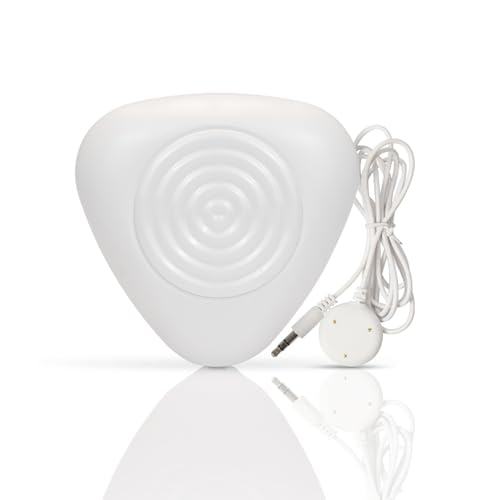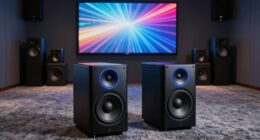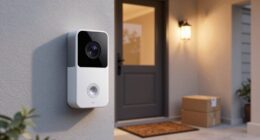I've gathered the 15 best smart home hubs of 2025 to help you simplify your home automation setup. These hubs, like the Aeotec Smart Home Hub and Amazon Echo Hub, integrate seamlessly with devices from various brands. With features like local processing and compatibility with Alexa and Google Assistant, they enhance both speed and security. The user-friendly setup makes things even easier, often taking less than an hour. If you're looking to optimize your smart home experience, keep exploring, as there's plenty more to discover about the features and benefits of these top hubs.
Key Takeaways
- Smart home hubs centralize control of diverse devices, enhancing convenience and compatibility with protocols like Zigbee, Z-Wave, and Wi-Fi.
- Notable hubs for 2025 include Aeotec Smart Home Hub, Amazon Echo Hub, Home Assistant Green, and SmartThings Hub, each with unique features.
- User-friendly setup processes typically take under an hour, ensuring quick integration of devices into your smart home ecosystem.
- Privacy and security are prioritized with local data storage, mic controls, and regular firmware updates to protect user information.
- Automation capabilities allow for customized responses based on triggers like motion detection or time of day, enhancing home efficiency.
Aeotec Smart Home Hub, Compatible with Alexa and Google Assistant
If you're looking for a smart home hub that seamlessly integrates with multiple devices and voice assistants, the Aeotec Smart Home Hub is a top contender for anyone in North America. It functions as a SmartThings Hub, Z-Wave, and Zigbee gateway, making it compatible with over 5,000 devices across various brands. Plus, it works effortlessly with Alexa and Google Assistant, allowing you to control everything with your voice. The setup is straightforward; just download the SmartThings app, and you're good to go. I appreciate that it can even manage devices locally during internet outages. With a compact design and solid customer ratings, this hub is definitely worth considering for your smart home ecosystem.
Best For: Individuals in North America looking for a versatile smart home hub that integrates with various devices and voice assistants.
Pros:
- Supports over 5,000 devices, ensuring compatibility with a wide range of smart home products.
- Allows local management of devices during internet disruptions, enhancing reliability.
- Easy setup process through the SmartThings app, making it user-friendly for beginners.
Cons:
- Not compatible with devices outside of North America, limiting its use for international customers.
- Some users have reported issues with specific devices, such as Schlage locks, requiring troubleshooting support.
- Requires internet access for initial setup, which may be inconvenient for some users.
Amazon Echo Hub Smart Home Control Panel with Alexa
The Amazon Echo Hub Smart Home Control Panel with Alexa stands out for anyone looking to unify their smart home experience in a user-friendly way. With an 8" touchscreen display, I can effortlessly control lights, cameras, and more, all through voice commands or simple taps. It's compatible with thousands of Alexa-enabled devices, making integration a breeze. I love that it supports various connectivity options, including WiFi and Zigbee, ensuring my devices stay connected even if my WiFi goes down. The customizable dashboard lets me access my most-used devices quickly. Plus, the privacy features, like the mic off button, give me peace of mind. While it's not perfect for high-quality audio or video, it's a fantastic hub for managing my smart home.
Best For: Individuals seeking a centralized control panel for their smart home devices with voice and touch accessibility.
Pros:
- Wide Compatibility: Works with thousands of Alexa-compatible devices across various connectivity options like WiFi, Zigbee, and Bluetooth.
- User-Friendly Interface: The customizable dashboard and 8" touchscreen make it easy to access frequently used devices without navigating through apps.
- Privacy Controls: Features multiple privacy options, including a mic off button, ensuring user data remains secure.
Cons:
- Limited Audio Quality: Not ideal for high-quality audio experiences and should be supplemented with existing speakers.
- Basic Video Functionality: Not suitable for extended video watching or managing highly specific apps.
- Device Management: Better suited for controlling devices rather than managing their settings, which is more efficiently done via the app.
Amazon Echo Show 8 with Alexa and Smart Home Hub
For those seeking an all-in-one smart home solution, the Amazon Echo Show 8 stands out with its impressive 8.0" HD touchscreen and robust smart home hub capabilities. This third-gen model packs a powerful punch with a 13 MP camera and dual-band WiFi, allowing seamless integration of devices using Zigbee, Matter, and Thread. I love how I can control everything from lights to cameras just by talking to Alexa or tapping on the display. Plus, it doubles as an entertainment hub, streaming shows and music with spatial audio. Privacy's covered too, with handy controls like a built-in camera shutter. Overall, the Echo Show 8 enhances my smart home experience while keeping everything organized and accessible.
Best For: Individuals looking for a versatile smart home device that integrates seamlessly with various smart technologies while providing entertainment and communication features.
Pros:
- Smart Home Hub: Controls multiple devices using Zigbee, Matter, and Thread, enhancing home automation.
- High-Quality Display and Audio: Features an 8.0" HD touchscreen and spatial audio for an immersive entertainment experience.
- Privacy Features: Includes a built-in camera shutter and microphone controls for added security.
Cons:
- Camera Performance: May struggle with low light conditions, affecting video quality.
- Display Lag: Users have reported occasional lag when using the touchscreen interface.
- Weight: At 36.6 oz, it may be heavier than some users prefer for portability.
Home Assistant Green Smart Home Hub
Looking for a smart home hub that combines power and user-friendliness? Let me introduce you to the Home Assistant Green Smart Home Hub. This compact, fanless device packs a quad-core processor, 32GB storage, and 4GB RAM, all while using just a couple of watts. Setting it up is a breeze—just plug in the power supply and Ethernet cable, and you're good to go, often in under an hour. It integrates seamlessly with numerous smart devices, allowing for automation like dimming lights for movie nights. Plus, your data stays private, stored locally. While some users encounter a learning curve, the robust capabilities make it a solid choice for anyone looking to enhance their smart home experience.
Best For: Those seeking a powerful yet user-friendly smart home hub that prioritizes data privacy and offers extensive automation capabilities.
Pros:
- Easy setup process, often completed in under an hour.
- Robust integration with various smart devices, enabling flexible automation.
- Local data storage ensures user privacy and control over personal information.
Cons:
- Some users may experience a learning curve, especially if unfamiliar with technology.
- Mixed feedback regarding integration complexity, with some finding it challenging.
- Limited support for more advanced features may require additional research for optimal use.
Amazon Echo (Newest Model) with Premium Sound and Alexa
If you're someone who values high-quality audio along with smart home integration, the Amazon Echo (Newest Model) is an ideal choice. The premium sound features a powerful woofer and tweeters that deliver rich, detailed audio, adapting to your room's acoustics. With Alexa at your fingertips, you can control your music from various streaming services and even sync playback across multiple Echo devices. The built-in smart home hub supports Zigbee and Matter, allowing you to manage lights and locks effortlessly. Plus, with eero Built-in, you can extend your Wi-Fi coverage. Users rave about the improved sound quality and the seamless integration with their smart home devices, making daily life more convenient. It's truly a standout in the smart home hub market.
Best For: Those who seek high-quality audio and seamless smart home integration in one versatile device.
Pros:
- Premium sound quality with rich audio that adapts to the acoustics of your room.
- Built-in smart home hub compatible with Zigbee and Matter for easy management of smart devices.
- Multi-room music capability allows for synchronized playback across multiple Echo devices.
Cons:
- Some users have reported intermittent music playback issues that may be related to internet connectivity.
- The design may be too bulky for smaller spaces or minimalistic setups.
- Limited language support may not cater to non-English or non-Spanish speakers.
Lutron Caseta Smart Lighting Hub (L-BDG2-WH)
The Lutron Caseta Smart Lighting Hub (L-BDG2-WH) stands out for anyone seeking seamless integration of lights, shades, and temperature control in their smart home. I appreciate its compatibility with up to 75 devices, including Lutron dimmers and Serena shades, as well as popular platforms like Alexa, Apple HomeKit, and Google Assistant. Setting it up was straightforward—just connect it to my router using the included cable. The app lets me control everything from my smartphone or Apple Watch, and I love scheduling automatic adjustments or creating custom scenes. While the app is simple, I found some features could be improved. Overall, Lutron's customer support has been excellent, making my experience with the hub quite positive.
Best For: Those looking for a versatile and user-friendly smart home hub to manage lighting, shades, and temperature with seamless integration across various platforms.
Pros:
- Supports up to 75 devices, allowing extensive customization and control over multiple smart home elements.
- Easy installation with clear instructions, making it accessible even for users with limited technical skills.
- Responsive voice control via Alexa, enhancing convenience and usability compared to other smart home devices.
Cons:
- App interface is basic, with some users preferring more intuitive designs for ease of use.
- Initial firmware updates can lead to installation challenges, particularly with update loops reported by some users.
- Limited temporary timer options, which may not meet all users' needs for quick adjustments.
Homey Pro Smart Home Hub for Home Automation
For anyone seeking a versatile and powerful solution to streamline their home automation, the Homey Pro Smart Home Hub stands out with its support for an impressive array of technologies, including Z-Wave Plus, Zigbee, and Matter. I love that it connects with over 50,000 devices from more than 1,000 brands, making it incredibly adaptable. The local-first approach means I can manage my devices without heavy cloud dependency, enhancing privacy and speed. Homey Flow allows me to create customized automations easily, like turning on my music when I walk in. However, I've noticed some challenges, particularly with North American device compatibility and customer support. Overall, it's a solid choice for anyone serious about home automation.
Best For: Home automation enthusiasts looking for a versatile hub that supports a wide range of devices and technologies while prioritizing local control.
Pros:
- Supports multiple technologies: Compatible with Z-Wave Plus, Zigbee, Wi-Fi, BLE, Infrared, Matter, and Thread, allowing integration with a vast array of devices.
- User-friendly interface: Generally straightforward setup and positive user experience with the app for creating automations and managing devices.
- Local control: Minimizes cloud dependency, enhancing privacy and providing quicker response times for device management.
Cons:
- Limited North American device support: Users may struggle with compatibility issues, particularly with Z-Wave devices.
- Customer service challenges: Frustration reported regarding responsiveness and support for device compatibility inquiries.
- Mixed integration experiences: Some users find claims of compatibility exaggerated, especially with specific brands like Tuya and SONOFF.
Amazon Echo Show 15 Smart Kitchen TV with Alexa
Designed for those who crave a seamless blend of functionality and entertainment in their kitchen, the Amazon Echo Show 15 Smart Kitchen TV with Alexa stands out with its impressive 15.6-inch Full-HD display. Its sleek design fits perfectly on my countertop, and the customizable widgets keep my calendars, to-do lists, and smart home controls organized. I love controlling my devices with just my voice or tapping on the dashboard. The built-in Fire TV is a game-changer, letting me binge-watch Netflix and YouTube while I cook. Plus, the 13 MP camera makes video calls a breeze. With multiple privacy controls, I feel secure while enjoying all its features. It's truly become the heart of my smart home!
Best For: The Amazon Echo Show 15 is best for families and individuals looking for a multifunctional kitchen device that combines smart home control, entertainment, and organization.
Pros:
- Versatile Functionality: Combines kitchen organization, smart home hub, and entertainment features all in one device.
- High-Quality Display and Sound: The 15.6-inch Full-HD display and premium audio enhance viewing and listening experiences.
- Privacy Features: Offers multiple privacy controls, including a mic/camera-off button and camera shutter for user peace of mind.
Cons:
- Size and Weight: The 15.6-inch size may not be suitable for smaller kitchens or countertops with limited space.
- Dependency on Wifi: Requires a stable internet connection for optimal performance, which may be a limitation in some areas.
- Limited App Ecosystem: While it supports popular streaming services, some users may find the app selection less extensive compared to standalone smart TVs.
SmartThings Hub 3rd Generation Smart Home Automation Hub
Looking for a smart home hub that effortlessly integrates with a range of devices? The SmartThings Hub 3rd Generation is a fantastic choice. It works seamlessly with Alexa and Google Home, plus it supports Zigbee, Z-Wave, and various cloud protocols. With its compact size of 5 x 5 x 1.2 inches and lightweight design, it's easy to place anywhere in your home. I found the setup process straightforward, often completed in under 15 minutes using the SmartThings app. Though some users noted occasional connectivity issues, especially with Wi-Fi, the Ethernet option provides reliable connections. Overall, it's a solid hub for automating your devices, with a generally positive rating from users. It's definitely worth considering for your smart home setup!
Best For: Smart home enthusiasts looking for a versatile hub that integrates with various devices and platforms.
Pros:
- Seamless integration with Alexa, Google Home, Zigbee, and Z-Wave.
- Easy setup process, typically completed in under 15 minutes using the SmartThings app.
- Compact and lightweight design makes it easy to place in any room.
Cons:
- Occasional Wi-Fi connectivity issues, with Ethernet being the preferred connection for stability.
- Some users experienced difficulties with device recognition during setup.
- Need for clearer instructions regarding device setup and troubleshooting based on customer feedback.
GHome Smart Mini Plug Compatible with Alexa and Google Home (4 Pack)
The GHome Smart Mini Plug stands out for anyone wanting to effortlessly integrate smart technology into their home without the hassle of complicated setups. This WiFi smart outlet works seamlessly with both Alexa and Google Home, making voice control a breeze. With its compact design, it fits perfectly without blocking other outlets, and you get four plugs in a single pack.
Setting it up is quick and easy thanks to improved WiFi technology. I love being able to control my devices remotely through the app, set timers, and create schedules. While some users have reported reliability issues over time, I've found it effective for managing lights and appliances. For convenience and value, I'd definitely recommend the GHome Smart Mini Plug.
Best For: Those looking to easily integrate smart technology into their home for convenient control of lights and appliances.
Pros:
- Compact design allows multiple plugs to be used without blocking adjacent outlets.
- Quick setup with improved WiFi technology for stable connections and remote access.
- Voice control compatibility with both Alexa and Google Home enhances user convenience.
Cons:
- Some users report reliability issues over time, with occasional unresponsiveness.
- Limited to 2.4GHz networks, which may restrict connectivity options for some users.
- Initial setup may require a secure network, which could be a barrier for less tech-savvy individuals.
Matter Smart Home Hub for Connected Devices
If you're seeking a hub that seamlessly connects your Tuya smart devices with popular platforms like Google Home and Apple HomeKit, the Matter Smart Home Hub is a fantastic choice. This hub supports Tuya's Zigbee standard and Thread devices, allowing you to control them through various apps, including Tuya and Smart Life. While it works best with Zemismart devices, keep in mind that not all Zigbee devices are compatible. I found the setup process to be a bit hit or miss, with some users reporting issues. However, once connected, I enjoyed using voice commands via Siri and Google Home. Just remember that you'll need a Matter border router to access its full potential!
Best For: Those looking to integrate their Tuya smart devices with major platforms like Google Home and Apple HomeKit while enjoying the flexibility of Zigbee and Thread connectivity.
Pros:
- Multi-Platform Compatibility: Works seamlessly with Google Home and Apple HomeKit, enhancing user experience.
- Voice Control Support: Allows for convenient operation through voice commands via Siri and Google Home.
- Versatile Control Options: Compatible with multiple apps, including Tuya and Smart Life, for easy management of connected devices.
Cons:
- Limited Device Compatibility: Not all Zigbee devices are supported, leading to potential frustration with non-Tuya products.
- Setup Challenges: Mixed user experiences with the installation process, including connectivity issues for some.
- Missing Accessories: The absence of a USB power brick in the package can hinder immediate setup and usage.
Hubitat Elevation Home Automation Hub (Model C-8)
For anyone seeking a reliable and responsive smart home experience, the Hubitat Elevation Home Automation Hub (Model C-8) stands out as an excellent choice. This hub supports a wide range of devices, including Alexa, Apple HomeKit, and Google Home, and it connects seamlessly with Zigbee, Z-Wave, and Matter protocols. What I love most is its local processing, which guarantees my automations run quickly and reliably, even during internet outages. The built-in automation apps make it easy to set up both basic and advanced functions without any programming skills. While I found the user interface a bit challenging at first, the community support and extensive resources on their website really helped me navigate through it.
Best For: Those seeking a reliable and versatile smart home hub that supports numerous devices and offers local automation processing for enhanced performance.
Pros:
- Local Processing: Ensures fast and reliable automation execution, even during internet outages.
- Wide Compatibility: Works with over 1,000 smart devices across various brands and protocols.
- User-Friendly Automation: Built-in apps allow easy setup of automations without requiring programming skills.
Cons:
- Learning Curve: Some users may find the user interface and programming editor challenging to navigate initially.
- Potential Bugs: Reports of occasional bugs can hinder the user experience.
- Community Reliance: Users may need to rely on community forums for troubleshooting and advanced setup assistance.
NEO Tuya Zigbee Gateway, Smart Home Automation Hub
Looking for a reliable smart home automation hub that integrates seamlessly with your existing devices? The NEO Tuya Zigbee Gateway is a fantastic choice. It connects via Ethernet, ensuring stable performance, even in high Wi-Fi traffic areas. I love that it supports up to 128 devices, making it perfect for extensive setups. Plus, its compatibility with Alexa and Google Assistant lets me control everything with just my voice. The Tuya Zigbee 3.0 support means I can easily manage my smart gadgets through a smartphone app. At just 3.2 ounces and compact dimensions, it fits anywhere. If you're looking to enhance your smart home experience, the NEO Tuya Zigbee Gateway is definitely worth considering.
Best For: Those looking for a reliable and versatile smart home hub that supports a wide range of devices and voice control options.
Pros:
- Stable Connection: Ethernet connectivity ensures reliable performance even in high Wi-Fi traffic.
- Wide Compatibility: Supports up to 128 devices and works seamlessly with Alexa and Google Assistant.
- User-Friendly: Easy smartphone control with Tuya Zigbee 3.0 support enhances the smart home experience.
Cons:
- Wired Connection Required: Must be connected to a router's LAN port, which may limit placement options.
- Limited Range: Zigbee devices may have a restricted range compared to Wi-Fi, potentially requiring additional repeaters for larger homes.
- Setup Complexity: Initial setup may be challenging for users unfamiliar with smart home technology.
Aqara Smart Hub M3 for Home Automation
The Aqara Smart Hub M3 stands out as an ideal choice for tech-savvy homeowners seeking seamless integration across multiple devices. This multi-protocol hub supports Matter, Thread, Zigbee, Bluetooth, and Wi-Fi, allowing me to connect up to 127 devices, although repeaters may be necessary. Its dual-band Wi-Fi and Power over Ethernet options guarantee reliable connectivity, while the built-in IR blaster lets me control my air conditioning seamlessly. The setup process is impressively quick, taking about 35 minutes, and it works well with Apple HomeKit and Alexa. However, I've encountered some issues during migration from older hubs, and customer support has been less than ideal. Overall, the M3 prioritizes privacy and security, making it a compelling choice for my home automation needs.
Best For: Tech-savvy homeowners looking for a versatile and secure home automation hub that supports multiple protocols and device integrations.
Pros:
- Supports various connectivity protocols including Matter, Thread, Zigbee, Bluetooth, and Wi-Fi, allowing for extensive device compatibility.
- Quick and easy setup process, typically completed in around 35 minutes, with good integration with Apple HomeKit and Alexa.
- Prioritizes privacy and security with encrypted local storage and no built-in microphones or cameras.
Cons:
- Users have reported challenges during migration from older hubs, leading to device disconnections.
- Customer support has been criticized for being less responsive and effective during migration issues.
- Range limitations may require additional hubs or extenders for larger homes, as users have noted connectivity issues beyond 60-65 feet.
Hubitat Elevation Home Automation Hub (Model C-8 Pro)
If you value local processing for faster response times and enhanced privacy, the Hubitat Elevation Home Automation Hub (Model C-8 Pro) might be your ideal choice. This hub controls over 1000 smart devices from brands like Philips Hue and Nest, integrating seamlessly with Alexa, Apple HomeKit, and Google Home. Its local processing guarantees reliability and speed, allowing you to create complex automation rules without relying on the cloud. I love the customizable dashboards and the ability to write custom rules for tailored experiences. Plus, it enhances security with instant notifications and energy management features. Just keep in mind, it may require some technical know-how to fully utilize its powerful functionalities. Overall, it's a solid choice for serious automation enthusiasts.
Best For: Those seeking a reliable and customizable home automation solution with a focus on local processing and privacy.
Pros:
- Local processing enhances speed and reliability, even during internet outages.
- Supports over 1000 smart devices from various brands, allowing for extensive compatibility.
- Offers powerful customization options for automation rules and dashboards.
Cons:
- Can have a steep learning curve for less technically inclined users.
- Some users find it overwhelming compared to other smart home systems.
- Requires technical knowledge to fully utilize its advanced features.
Factors to Consider When Choosing Smart Home Hubs
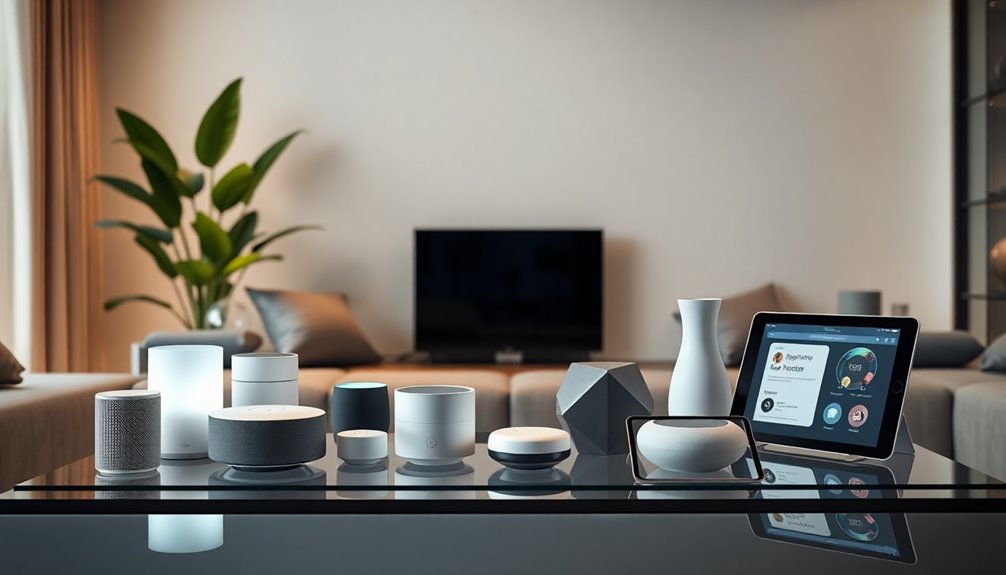
When I'm choosing a smart home hub, there are a few key factors I always consider. Compatibility with my devices, the available connectivity options, and the automation capabilities are essential. I also look for a user-friendly setup process and the benefits of local processing to guarantee everything runs smoothly.
Compatibility With Devices
Choosing a smart home hub that fits your needs means understanding its compatibility with various devices. Different hubs support various protocols like Zigbee, Z-Wave, Wi-Fi, and Thread, which directly impacts the range of devices you can control. I've found that many hubs also integrate well with popular voice assistants like Alexa, Google Assistant, and Apple HomeKit, making it easy to control your devices with just your voice.
Another factor to evaluate is how many devices a hub can support. Some hubs can manage dozens, while others can handle thousands, giving you room to expand your smart home setup over time. However, be cautious—some hubs are designed for specific ecosystems like Matter or Tuya, which may limit compatibility with non-certified devices.
Before making a decision, I always check if the hub supports all the brands and types of devices I plan to use. Certain hubs might have known issues with specific products, which can hinder functionality. By ensuring compatibility, you can create a seamless smart home experience tailored to your needs.
Connectivity Options Available
While evaluating smart home hubs, the connectivity options available can greatly influence your decision. I've found that hubs connect using various protocols like Wi-Fi, Zigbee, Z-Wave, Thread, and Bluetooth, which allows for integration with a wide range of devices. If you're considering a hub, check if it supports dual-band Wi-Fi (2.4GHz and 5GHz). This feature can considerably improve connectivity and performance throughout your smart home.
For those who prefer a more stable connection, some hubs offer Ethernet ports. This can reduce the risk of disconnections that sometimes occur with Wi-Fi. Additionally, compatibility with Amazon Sidewalk can enhance connectivity for compatible devices, even if your main Wi-Fi network goes down.
I also recommend looking for hubs with local processing capabilities. This means they can continue to control devices and automate tasks without relying on cloud services, ensuring everything runs smoothly during internet outages. Ultimately, the right connectivity options can make or break your smart home experience, so it's worth taking the time to evaluate what each hub offers.
Automation Capabilities Offered
Automation capabilities in smart home hubs can considerably enhance your overall experience, making your home not just smarter, but also more convenient and efficient. I love the way these hubs enable connected devices to perform actions based on triggers like time of day or motion detection. For instance, I can set my lights to dim and my thermostat to adjust just in time for movie night.
Many hubs let you create custom routines or scenes that allow multiple devices to work together seamlessly. This feature not only enhances comfort but also boosts energy efficiency. I appreciate the reliability of local processing, too; it guarantees my devices keep functioning even during internet outages.
Advanced automation options, like "if-this-then-that" scenarios, provide tailored responses to specific events, making my home feel truly intuitive. Plus, hubs that integrate various protocols like Zigbee, Z-Wave, or Matter expand the range of compatible devices, allowing for more extensive automation possibilities across different brands and technologies. With these capabilities, I feel empowered to create a smart home that meets my unique needs and preferences.
User-Friendly Setup Process
How easily can you set up a smart home hub? That's a vital factor to ponder when choosing the right one for your home. I've found that the best hubs usually offer a simple plug-and-play installation. You often just need a power supply and Ethernet connection to get started. Many hubs come with mobile app support that guides you through the setup steps, making it possible to finish the process in under 15 minutes.
I really appreciate hubs that feature advanced pairing technologies, like QR code scanning, which streamline adding multiple devices. It's also a relief when I encounter clear and concise instructions along with troubleshooting resources. These elements allow me to resolve any issues independently without pulling my hair out.
User feedback plays a significant role too. I've noticed that intuitive interfaces and responsive customer support can make or break the setup experience. When I can navigate the setup smoothly and get quick help if needed, it makes the whole process enjoyable. So, keep these factors in mind to guarantee your smart home journey starts off on the right foot!
Local Processing Benefits
When considering a smart home hub, the benefits of local processing can't be overlooked. First off, local processing guarantees that my devices stay functional even during internet outages. There's nothing worse than dealing with unresponsive smart devices when the Wi-Fi goes down. Plus, I've noticed that locally processed commands execute much faster, making my smart home feel more seamless and responsive.
Another big advantage is the ability to create complex automation scenarios. With local processing, I can set up detailed "if-this-then-that" rules without relying on external servers. This flexibility allows me to tailor my smart home environment exactly how I want it. Additionally, hubs with local processing usually support a broader range of protocols and devices, which means I can incorporate various gadgets into my setup without limitations.
Lastly, while I won't plunge into privacy just yet, it's worth noting that local processing does keep my data closer to home, reducing the risk of exposure. Overall, if you're looking for a smart home hub, consider how local processing can enhance your experience and functionality. It's definitely a factor I prioritize when making my choice.
Privacy and Security Features
While I appreciate the convenience of smart home hubs, I can't overlook the importance of privacy and security features when making my choice. I want to make sure that my personal data is safe and that I'm in control of it. For starters, many smart home hubs prioritize user privacy by storing data locally on the device instead of relying on cloud storage. This can greatly reduce the risk of data breaches.
I also look for advanced privacy controls, like microphone and camera off buttons, which give me peace of mind against unauthorized access. Some hubs even offer encrypted local storage for sensitive data, guaranteeing my information remains secure even if the device is compromised.
Regular firmware updates are another critical feature; they help protect against vulnerabilities and keep the hub compliant with the latest security standards. Finally, I appreciate hubs that allow me to manage my data easily—being able to view, share, or delete my information gives me greater control over my privacy. With these security features in place, I can enjoy the benefits of automation without sacrificing my privacy.
Supported Voice Assistants
Choosing the right smart home hub goes beyond just privacy and security; it also involves considering the supported voice assistants. You'll want a hub that works seamlessly with popular options like Amazon Alexa, Google Assistant, and Apple Siri. Having this compatibility enhances your convenience, allowing you to control devices hands-free—whether it's adjusting the thermostat, locking doors, or turning on lights.
I've found that some hubs offer advanced features, like voice control for automation routines. This means you can trigger multiple devices with a single command, making your home smarter and more responsive. Imagine saying, "Goodnight," and having your lights dim, the thermostat adjust, and the front door lock—all in one go.
Additionally, integrating voice assistants can help streamline household management. You can check the status of devices, set timers, and even get reminders—all using just your voice. However, it's essential to verify the specific voice assistant compatibility of any smart home hub. Some hubs may limit you to one or two options, which could impact your overall experience. Take the time to confirm your choice aligns with your voice assistant preferences for peak functionality.
Upgradability and Future Proofing
As I explore the best smart home hubs, upgradability and future-proofing stand out as critical factors. I always look for hubs that support multiple protocols like Zigbee, Z-Wave, Matter, and Thread. This compatibility guarantees that I can connect a wide range of devices now and in the future. It's also significant to choose hubs that provide regular software updates and firmware improvements. This way, I can enhance functionality and security over time without needing to replace the entire system.
I prioritize devices that integrate seamlessly with third-party platforms, allowing me to easily expand and adapt as new smart home technologies emerge. Community support is another fundamental element. Active user communities often share valuable insights for troubleshooting and future enhancements, which can be a lifesaver.
Finally, I check if the hub allows for local processing capabilities. This feature not only boosts speed and reliability but also reduces my dependency on cloud services, making my smart home more resilient to changes in internet connectivity. By considering these factors, I can guarantee my smart home hub remains relevant and efficient for years to come.
Frequently Asked Questions
What Is the Average Lifespan of a Smart Home Hub?
I've found that the average lifespan of a smart home hub is typically around 3 to 5 years. This can vary depending on the brand, usage, and how well you maintain it. Some hubs might last longer if they receive regular updates and care, while others could fail sooner due to hardware issues. It's always a good idea to keep an eye on performance and consider upgrades as technology advances.
Can Smart Home Hubs Work Without Wi-Fi?
Absolutely, smart home hubs can work without Wi-Fi, but it depends on the model. I've found that some hubs operate on Bluetooth or Zigbee, allowing me to control devices locally. However, without Wi-Fi, I can't access remote features or cloud services. If I'm in a power outage or my internet goes down, it's nice to know I still have some level of control over my smart devices.
How Do I Reset My Smart Home Hub?
Resetting my smart home hub is pretty straightforward. I usually locate the reset button, which is often on the back or bottom of the device. I press and hold it for about 10 seconds until the lights blink or change color. After that, I wait for it to reboot, and then I can set it up again. It's a simple process that helps if I'm experiencing connectivity issues.
Are Smart Home Hubs Compatible With Older Devices?
I've found that many smart home hubs do work with older devices, but compatibility can vary. When I set up my hub, I checked the manufacturer's specifications and forums for user experiences. Some hubs support legacy protocols, while others may not. I recommend researching specific models and brands to guarantee they'll integrate smoothly with your existing devices. It's always a good idea to look for firmware updates that might improve compatibility too!
What Are the Security Risks of Using a Smart Home Hub?
Picture your home as a castle, with a smart home hub as the drawbridge. While it connects your devices, it also invites potential intruders. I've noticed that security risks include hacking, data breaches, and unauthorized access to personal information. These vulnerabilities arise from weak passwords or outdated firmware. To protect my home, I prioritize regular updates and strong security practices, ensuring my digital fortress remains secure against unwelcome guests.
Conclusion
In the ever-evolving world of smart home technology, choosing the right hub is like picking the perfect conductor for an orchestra—you want harmony and seamless integration. With options like the Aeotec Smart Home Hub and Amazon Echo Show 8, you can create a symphony of convenience and control in your home. So, take your time, weigh the options, and soon, you'll be enjoying a beautifully automated lifestyle that feels just right. Happy smart home shopping!
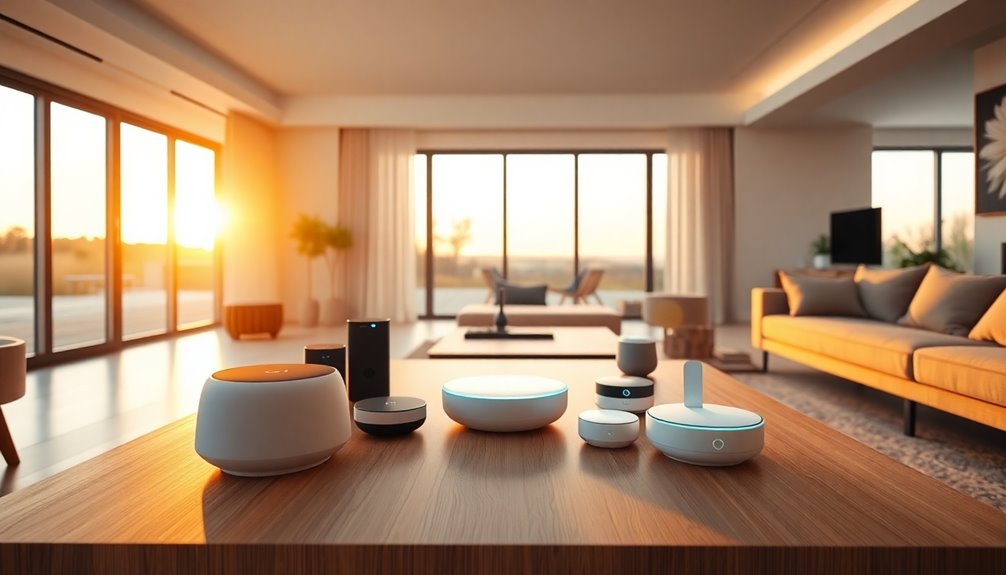




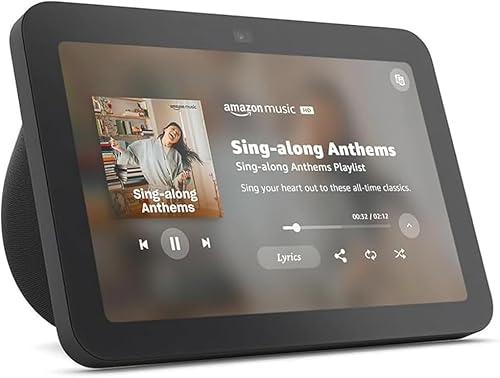





![SmartThings Hub 3rd Generation [GP-U999SJVLGDA] Smart Home Automation Hub Home](https://m.media-amazon.com/images/I/21hChu0ounL._SL500_.jpg)



